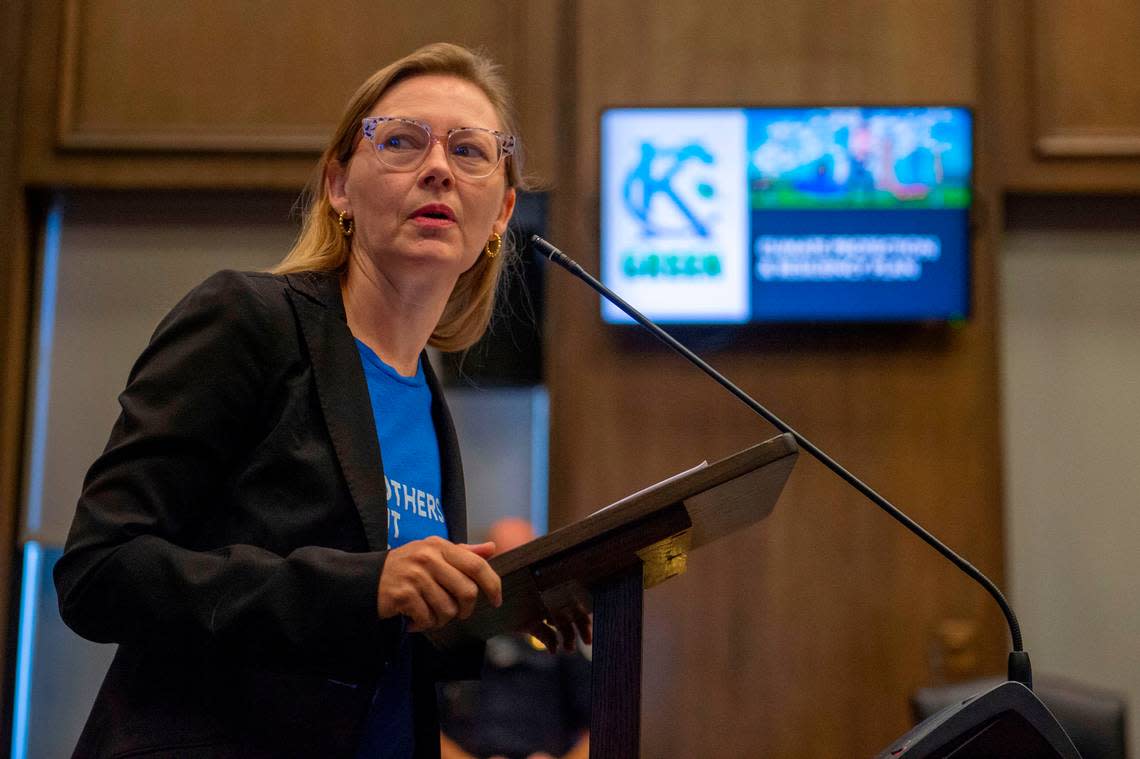‘A huge day’: Climate plan to make Kansas City carbon-neutral by 2040 moves forward
Update: On Thursday, Kansas City Council passed the Climate Protection & Resiliency Plan with a 11-1 vote. Councilwoman Heather Hall, District 1, was the only councilperson to vote in opposition of the plan.
Kansas City is one step closer to approving a new equity-focused climate plan designed to put the city on track with the terms of the Paris Climate Agreement.
If it passes through council, the city’s proposed Climate Protection and Resiliency Plan, which has been described as a road map, will help inform municipal climate policy moving forward. The ultimate goal is for Kansas City to achieve carbon neutrality by 2040.
After listening to public testimony from about 60 people, including climate activists, parents, teachers, business owners and utility workers, an amended version of the plan passed through committee Wednesday.
“This is a huge day for the community and it’s a huge day for kids,” said Robin Ganahl, chair of the climate protection steering committee and co-founder of the KC chapter of Mothers Out Front. “We’re just so excited and hope to see it adopted tomorrow.”
The main goal of the 133-page plan is to reduce greenhouse gas emissions in Kansas City. The plan also acknowledges that marginalized communities are more likely to be severely impacted by climate change. In Kansas City that looks like heat islands, poor air quality and increased risk of flooding in many already under-served communities.
The city’s first climate plan was made official in 2008, also with a focus on greenhouse gases. But the city last year decided that bolder steps were needed to combat the climate crisis.
In November, City Hall declared a climate emergency, and the city’s climate protection steering committee was tasked with drafting an updated climate plan with more specific and aggressive goals centered around the future of mobility, energy supply, natural systems, homes and buildings, food, and waste and materials.
Evergy and Spire, the two largest private utility companies in Kansas City, say they support most aspects of the draft. But they say they are concerned that the plan turns focus away from natural gas, the benefits of which they have argued since at least April.
The initial draft put before council was amended slightly on Wednesday, at the request of Councilwoman Melissa Robinson, District 3. One of the main changes, all of which Ganahl described as wordsmithing, replaced the phrase “clean electricity” with “clean energy,” appeasing concerns from energy companies that natural gas was being excluded.

Councilman Eric Bunch, District 4, said he had strong concerns that using the phrase “clean energy” was vague, and could lead to “green washing,” or creating policies and practices that claim to be environmentally-friendly without actually addressing the root cause.
The amended resolution ultimately passed through committee 5-1. Councilwoman Teresa Loar, District 2, was the only committee member to vote against the amended resolution.
The climate protection steering committee was ultimately OK with the changes, because the spirit of the plan remained intact, Ganahl said.
Kansas City summers could be as hot as 125 degrees in the next 30 years, study finds
Stephen Mills, the vice president and general manager for Spire Missouri West, said while he felt there were some improvements made to the original plan, he didn’t feel the changes went far enough.
Ultimately, he said, Spire wants to continue giving people a choice on whether to continue using natural gas. He fears the future might look different.
The plan does not mandate electricity or outlaw other energy sources, Laura Isch, sustainability manager, told council members. She in part was addressing comments made by Councilwoman Heather Hall, District 1, who feared the plan could affect the future of Kansas City’s barbecue business that rely on natural gas.
“There’s literally a law in Missouri that says there’s a natural gas preemption,” Isch said last week. “We cannot take away a consumer’s choice to natural gas.”
Instead, this plan hopes to help guide the city to take advantage of federal money that’s becoming available through the Inflation Reduction Act. She hopes families wanting to make climate-friendly changes to their homes will get financial help covering the upfront costs of those changes.
Billy Davies, a conservation program coordinator with the Sierra Club’s Missouri branch, said despite the concessions made, “this is a climate plan that Kansas City, Missouri, and the whole region, can and should be proud of.”
